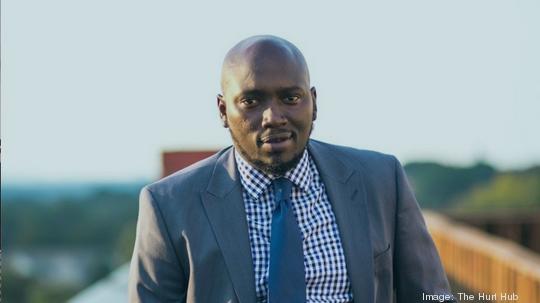
Atlanta entrepreneur and Davidson College alum Mbye Njie is returning to the Charlotte area as The Jay Hurt Hub for Innovation and Entrepreneurship's inaugural innovator in residence.
Njie, a 2004 Davidson graduate and founder of tech startup Legal Equalizer, was offered the year-long position that includes a $75,000 grant for one year. The goal is for Njie and his team to grow the business while employing Davidson students, engaging with Hurt Hub coworkers and providing mentorship for the Davidson community.
Liz Brigham, The Hurt Hub executive director, said the cost of employing two students was built into the grant, though Njie has already hired seven students through the Gig Hub. The residency runs through June of 2022.
"We wanted somebody who would really be here to actively work on their business such that students could also participate in its growth, to help drive the growth of that entity, but also learn and understand what it means to be an entrepreneur," she said.
Legal Equalizer
Njie founded Legal Equalizer in Atlanta in 2015 after he was pulled over by police three times in a span of 10 days. He said it was during that third traffic stop that he realized he, a Black man, had been profiled.
"The third time, I was headed to work when the officer pulled me over and told me they had a warrant for my arrest," he said. "I wouldn’t have (Legal Equalizer) right now if he’d just gone back to his car and checked out the warrant, but instead, I was put in handcuffs and put in the back of his car."
Njie said the officer spent 10 minutes looking inside his car through the windows and eventually stated the warrant was "invalid" before letting him go.
"I knew I was being profiled," he said. "When I started this it was simply that I wanted my mom to know exactly where I was, and I wanted a video of what could have ended up happening to me."
Njie said the app currently has 250,000 registered users, and Njie's goal is to reach 1 million by the end of 2021.
What started out as a way to protect himself and others during potential encounters with law enforcement evolved into much more, he said. Many conversations with people of all ages, races and genders helped realize Legal Equalizer could be just as helpful for people in domestic violence, sexual assault or immigration situations.
The platform allows users to select five to 10 "people you trust who you know would answer in an emergency," Njie said. Those people will get a text with a specific message, depending on the type of situation, as well as the user's exact location via Google Maps.
"We also allow the user the option to record the incident or stream a live video to their group of emergency contacts through a Zoom link," he said. "Those people can then hear and see exactly why you're being stopped."
Njie said he's currently working with several bar associations to give users the ability to contact an attorney in real-time, if necessary. The app also provides a variety of laws related to traffic stops so users are educated about their rights, as well as the expectations of a police officer during contact.
"When we started, I didn’t want law enforcement to look at this as an anti-policing app," he said. "The laws we provide to users regarding what to expect during a traffic stop came directly from police officers I've spoken to about this."
Njie added, "I've spent time explaining to police that the more accountability we have, overall, the better it is for the good cops who get sick and tired of being chastised even though they’re doing their jobs properly."
Innovator in residence
The innovator in residence position was one born out of Davidson's Commission on Race and Slavery, Brigham said.
"We wanted a Davison alum who has a for-profit venture actively focused on social justice issues to be in-residence to grow and incubate their business at The Hurt Hub," she said. "Mbye met and exceeded the criteria we were looking for, in general. What's really important is that from an anthropology perspective, he's taken it upon himself to look at this issue from a multitude of perspectives.
Brigham added, "He has manifested what we really focus on here — the pursuit of knowledge and looking at things from every perspective and overlaying a very critical thinking liberal arts framework."
Njie said he's most looking forward to working directly with college students to gain their perspective and insight on the platform.
"I've always wanted to work with students because this app was built with college students in mind," he said. "I expect them to help me grow it through hearing their perspective of what works, what doesn’t work, what pain-points they have and how the app can help them."
Njie also plans to engage with police departments in Davidson, Charlotte and the surrounding communities. Bringing local law enforcement into the fold, he said, will only serve to make Legal Equalizer better.
"I hope to continue that spirit of collaboration in the Charlotte area, as it should help keep them safer as well," he said.
Brigham said she hopes the innovator in residence is a position Davidson College will be able to establish for years to come.
"We’re actively fundraising for people to support the endowment of this role moving forward," she said. "We'll be looking for someone new each year, as it's an annual role with the same overview and focus."



